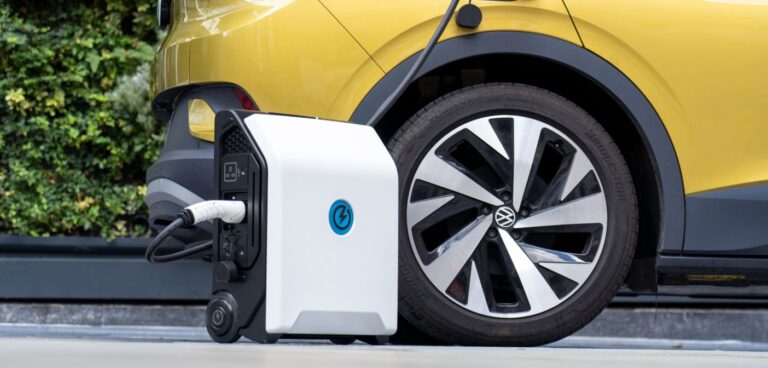UK startup ZipCharge has announced that its portable EV charger, the Go, has advanced to the validation prototype stage with designs released for manufacture and hardware testing underway.
Developed by co-founders Richie Sibal and Jonathan Carrier, the ZipCharge Go has been designed to make home charging accessible to EV drivers unable to plug-in at their house due to not having off-street parking.
ZipCharge is building several iterations of Go prototypes from validation through to pre-production, all of which will undergo an extensive testing regime ahead of delivery of the first models to customers in 2023.
The company’s engineers are currently at advanced stages of lab testing the portable EV charger’s key system components, including NMC lithium-ion battery cells and bi-directional AC-DC converter. This is to evaluate thermal behaviour, charging performance, safety, durability and full functionality to ensure safety.
The bi-directional AC-DC converter utilises high efficiency silicon carbide semiconductors found in modern EVs. When coupled with ZipCharge’s software it will enable the Go to be charged at home, using a standard single phase supply in just over one hour. It can then be connected to an EV wherever it is parked and deliver 20 to 40 miles of range in around 30-60 minutes, depending on the capacity of the Go charger.
The Go is the first element of a planned global portable EV charging platform that combines hardware, software, and ownership models. Future plans include ZipCharge’s portable EV powerbanks creating an intelligent energy management platform that provides flexibility and resilience for the national power grid.
Sibal said: “Achieving this key milestone in the development of the portable EV charger is a major achievement by our small and dedicated team of expert automotive engineers.
“Drawing on the team’s 170 years of experience in designing automotive electronic systems, including EV control systems, battery modules, power electronics, electrical architectures, functional safety and wiring systems, combined with significant expertise in CAD modelling and design has enabled us to progress from the drawing board to design release in under nine months.”
In tandem with hardware testing, ZipCharge is also developing control software and a dedicated mobile application that will allow users to optimise the operation of the portable EV powerbank. This incorporates a suite of security features, including user authentication and the ability to remotely monitor, track and disable the Go charger from their mobile phone, thanks to built in 2G/4G connectivity.
In addition to the mobile app, ZipCharge is developing software tools designed to provide users with intelligent control of charging and energy management, efficiently and at low cost. This includes dedicated data dashboards for fleets to manage a suite of Go chargers, optimise deployment, monitor charging history while using data to make recommendations that reduce operating costs and improve the total cost of ownership.
What’s more, ZipCharge is building machine learning and artificial intelligence into its software stack, to learn user charging patterns, make schedule recommendations and optimise charging to save money and reduce the load on the grid.
“We’re already in advanced discussions with a number of large corporate fleets and listening to their requirements, along with product suggestions from our enthusiastic prospective customer base,” said Carrier. “We are committed to launching a truly ground-breaking product in the Go, one that meets the needs of a range of customer groups, and how they would like to use the Go.
“This includes private individuals, fleets and end-destinations, such as hotels, retail complexes, supermarkets and leisure activities – all locations where the ZipCharge Go can provide flexible, convenient and low-cost charging for everyone, anywhere they park.”
Final pricing of the ZipCharge Go is expected to be confirmed in Q4 2022 as part of the pre-order process. According to Carrier, it “will be competitively priced and comparable to the purchase and full installation cost of a fixed home charger”.





